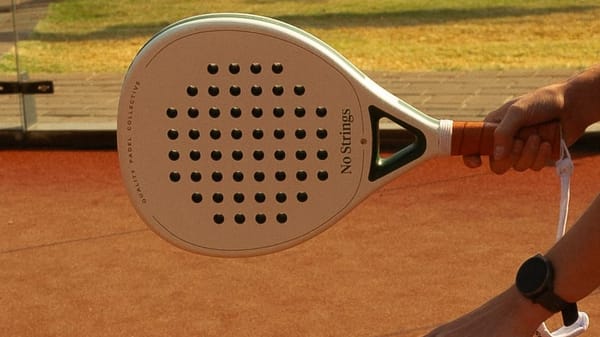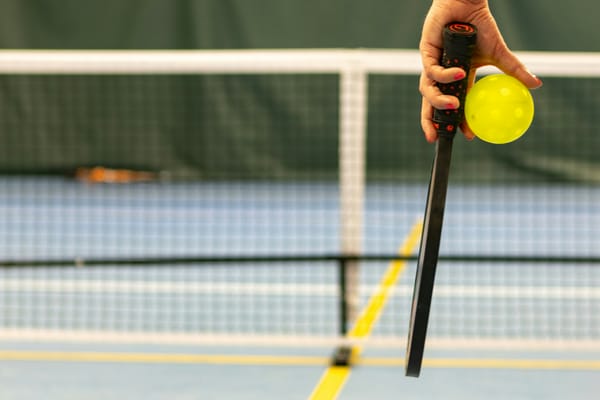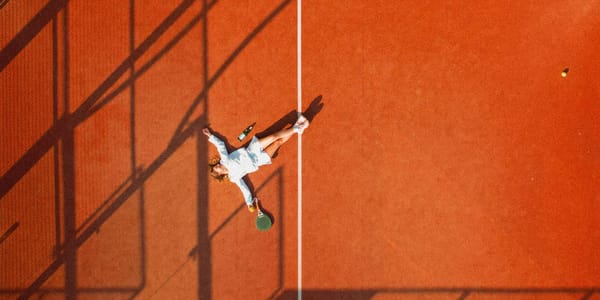The 5 Unwritten Rules of Padel: A Guide to Etiquette for New Players

If you’re new to padel, chances are you’ve been told it’s the fastest-growing sport in the world. You’ve probably been invited to a few friendly matches, and maybe you’ve even ordered your first racket. But once you’re on court, there’s something you won’t find written on the walls or in the rules: etiquette.
Padel might be casual, but it has its own rhythm and culture. And like any great social sport, it works best when everyone’s in sync - from how you show up to how you play, and even how you leave the court.
So here it is. The No Strings guide to padel court etiquette.
1. Don’t be the “Just Arrived” guy
Padel is built on bookings. That means you’re not just late when you arrive ten minutes after your slot — you’re cutting into everyone’s game. It throws off the tempo, forces a rushed warm-up, and kills the pre-match chat that makes padel what it is: social.
Make a habit of arriving early. You don’t need to be there half an hour in advance with a foam roller and electrolyte drink, but being ready to hit the court on time matters. You’ll start the match more relaxed, more prepared, and less apologetic.
Also, bring balls. Please. It’s one of the most basic bits of padel etiquette, and yet so many players “forget.” If you’re joining a casual match, offer to bring a fresh can or rotate responsibility. It’s a tiny gesture, but it goes a long way — and avoids the awkward moment when you’re playing with two fluffless balls and a third one no one can find.
2. Call your own fouls
There are no referees on your local court. Padel is self-governed. Which means integrity matters more than ever.
If the ball hits your body, even slightly, it’s your responsibility to call it. If it hits the glass before it touches the ground, own it. If your shot was clearly out, don’t pretend you’re unsure. This isn’t a televised final with slow-motion replays — it’s a friendly match built on trust.
Good players respect honesty more than sneaky points. You’ll get a lot more respect for calling your own foul than for pretending you didn’t see what everyone else just did. It might cost you a point, but it wins you something more important — trust.
It’s also worth noting that etiquette goes both ways. If your opponent makes a call you disagree with, accept it with grace. Ask to replay the point if things are unclear, but don’t turn it into courtroom drama. Nobody wants to lose a match because of a dodgy call, but even fewer want to lose a friend over one.
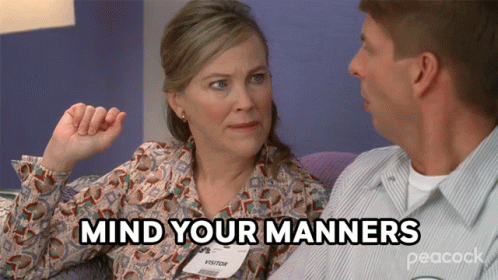
3. Let your partner breathe
Padel is a doubles game. And doubles games rely on chemistry.
That means you’re not just playing the ball — you’re playing with your partner. One of the most important pieces of padel court etiquette is learning how to support them. Even when they’re having a shocker.
Everyone hits the glass instead of the floor now and then. Everyone gets lobbed. Everyone whiffs a smash. What matters is how you respond. Rolling your eyes, muttering under your breath, or coaching every two points? That’s how you kill the vibe and lose the match. Instead, fist bump them. Say “unlucky” and move on. Stay positive, even if you’re two games down.
If your partner knows you’ve got their back, they’ll play with more confidence. And that lifts the whole team. In fact, one of the best compliments you can get after a game is “You’re great to play with.” That usually means you made the experience better regardless of the score.
Good partners make better players. And good etiquette on the court makes for better padel, every time.
4. Keep the game flowing
A good padel match has rhythm. It flows. It doesn’t stop for unnecessary delays or long pauses between points.
That means doing your part to keep things moving. If the ball goes out, go fetch it quickly. If your partner is serving, pass them the second ball so they don’t have to chase it down. If your opponent hits a net cord, grab the ball and return it — don’t make them walk across the court. These little gestures speed things up, show respect, and keep everyone focused on the game.
It also means keeping your breaks short. You don’t need a full sit-down and a lecture between games. A quick sip of water is fine - a full hydration routine between every point is not. Nobody wants to feel like they’re waiting around while you search for your overgrip in the bottom of your bag.
Keep it light. Keep it fast. You’ll fit more rallies into the hour and enjoy the match a lot more.
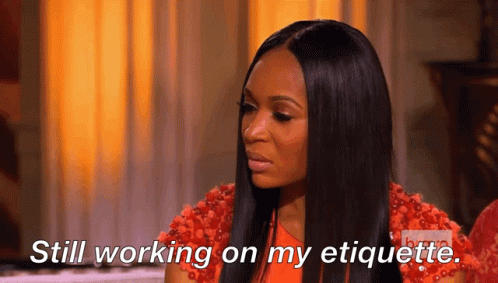
5. Respect the vibe
Every padel court has its own energy. Some games are quiet and focused. Others are full of banter and laughs. But the golden rule is this: read the room, and don’t be a buzzkill.
That means no smashing balls at beginners in friendly games. No meltdowns over missed points. No passive-aggressive coaching or moaning about your partner. If you’re lucky enough to play with someone better than you, thank them. If you’re the better one, don’t act like it.
Padel is a social sport at its core. Most people are there for a hit, some movement, and a laugh. The best etiquette is knowing when to compete and when to chill. And if you can do both, even better.
Also, quick tip: don’t ghost. If you’ve committed to a game, show up. Cancelling last-minute or going quiet in the WhatsApp group the day of a match? It gets noticed. A reliable player is a respected player and you’ll get invited more often.
Final Word
Etiquette isn’t about rules. It’s about rhythm. It’s about respect. It’s about building a culture where padel feels like a club — not a chore.
If you’re new to the sport, these five unwritten rules will fast-track your way into more games, better partners, and stronger rallies. Because good padel is more than technique — it’s teamwork, flow, and connection.
Show up on time. Play fair. Support your partner. Keep things moving. Respect the vibe.
That’s how padel works. That’s how good games happen.


